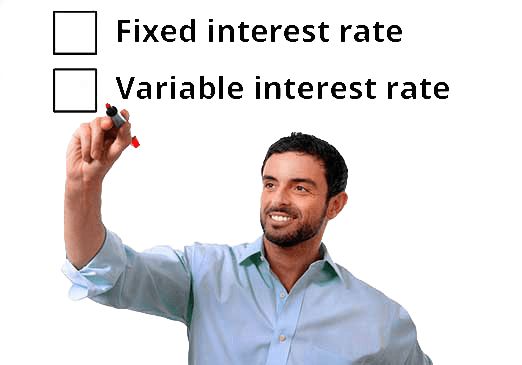
To fix or not to fix
If you’re about to buy a house or you’re looking to refinance you may be asking yourself, should I fix my home loan or not?
Like most decisions, there are pros and cons for each option.
Here are some things to think about to help you decide.
Pros and cons of fixed rate home loans
Fixed home loans have an interest rate that is fixed for a set period of time – often 1, 3 or 5 years.
At the end of the fixed rate term, the loan will usually switch to the standard variable rate offered by the lender.
Here are some advantages of fixing your home loan:
- Makes budgeting easier – You know exactly what you’re repayments will be, so you can plan ahead and set financial goals with confidence.
- Rate rises won’t affect you – If interest rates rise above your fixed rate, you will be happy knowing you are paying less than the variable rate.
But there are some disadvantages with fixing your loan:
- Rate drops won’t apply to you – You won’t benefit from a drop in interest rates if your fixed rate is more than the variable rate.
- Limits on extra repayments – Additional loan repayments are often not allowed with fixed rate loans or repayments may be capped at a low amount or only permitted with a fee.
- Do you need to redraw? – A redraw facility may not be offered on a fixed rate loan.
- Break fees – Fixed rate loans may have a break fee if you change or pay off your loan within the fixed rate period.
This kind of loan may not be suitable if you are thinking about selling your home or want the freedom to switch home loans if you find a better deal.
Get an indication of how much your repayments might be with a fixed home loan.
What you’ll gain and lose with a variable rate home loan
If you don’t fix your loan, your interest rate will move with changes to market interest rates.
This means the interest rate can rise or fall over the term of your loan. As a result, your repayments will ‘vary’ as the rate changes.
Here are some advantages of a variable rate home loan:
- You can make extra repayments – Extra repayments are usually allowed at no extra cost, which can save you interest and help you pay off your loan sooner.
- More features – Variable loans often have attractive features such as unlimited redraws on any additional repayments or the ability to save on interest by setting up an offset account.
- Easier to switch loans – It is usually easier and cheaper to switch loans if you find a better deal elsewhere if you have a variable rate home loan.
Here are some disadvantages of a variable rate loan:
- Makes budgeting harder – It can be difficult to budget with certainty as loan repayments can increase when interest rates change.
- Mortgage stress – If you aren’t prepared for a rate rise you may have trouble keeping up with repayments.
Splitting your loan – part fixed and part variable
Another option is to make a bet both ways by having a part fixed, part variable interest loan. A split loan allows you to manage some of the risks of interest rate rises while still being able to make extra repayments.
There’s generally no limit to the way you can split the loan, so you can allocate the funds 50/50 or 20/80 – the decision is up to you.
Whatever loan you decide to take out, it needs to work for you. That means the loan should have the features, flexibility and fees that are the most appropriate for your needs.
If you want to sit down with a mortgage broker who can walk you through the right process and information that will enable you to make the right decision, contact us and we would be happy to help.
Case study: Adam and Matti decide to fix part of their home loan

Adam and Matti have saved up a deposit and want to borrow $440,000 for a $600,000 apartment.
Using MoneySmart’s mortgage calculator they work out what their repayments will be for a fixed or variable rate loan:
- Fixed rate loan – If they fix their rate for 3 years at 4.50% their repayment will be $2,456* per month.
- Variable rate loan – If they choose a variable rate loan at 4.25% they will be repaying $2,394* per month at first. If the bank increases the variable rate by 0.5% to 4.75%, they will be repaying around $2,516* per month.
The fixed rate will cost them $62 more per month to start with but it will save them money in the future if the variable rate increases. The variable rate is tempting because they would pay less right now and have the flexibility to make extra repayments without fees.
Matti and Adam know their budget will be tight over the next couple of years (they plan to travel and get married) and they think they will be stressed if there is a big jump in their mortgage payments.
They decide to fix two-thirds of their home loan for 3 years so they can still make extra repayments if they have extra money.
*Based on a 25-year loan with fees of $10 a month.
